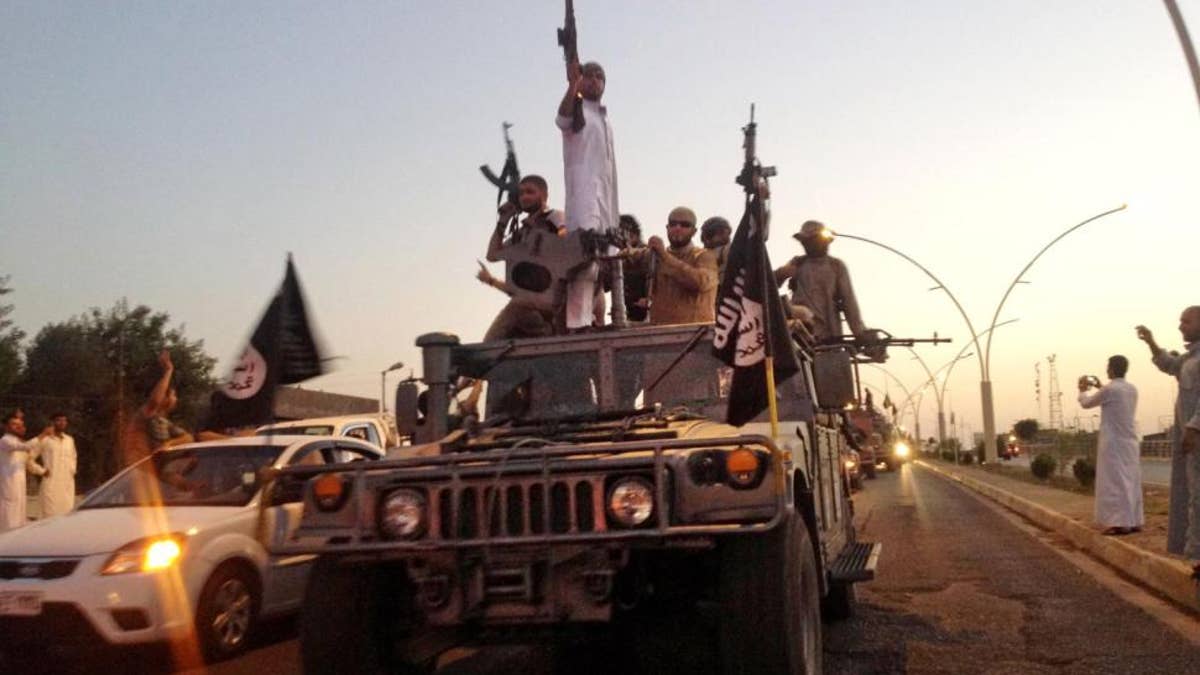
ISIS fighters near Mosul in 2014. (AP Photo/File)
On Monday, June 27, just before the break of day, figures approached the sleepy border village of al-Qaa, a predominantly Christian community in northeast Lebanon.
The streets were slowly beginning their morning bustle as residents shook off a lazy weekend and resumed their business. Not far from a group of homes, a blast suddenly shook the town awake. Three more blasts followed shortly after the first. The intruders had detonated themselves, killing five and injuring 15 others.
On the evening of the same day, as family members and neighbors gathered outside a historic church to mourn the victims of the morning’s attack, two assailants riding a motorcycle threw a grenade at the crowd and then detonated their own suicide vests. Another 13 were wounded.
In all there were eight suicide bombings that day alone.
While no particular organization has claimed responsibility for the attack, nearly all experts believe it was carried out by ISIS fighters who infiltrated al-Qaa from nearby Syria. It is also a commonly known fact that in Lebanon’s sprawling refugee camps some ISIS fighters have found refuge for their families. Their jihad -- in effect -- subsidized by the disorganization of the international community.
Make no mistake, the targeted village for one reason: it is Christian.
This brazen attack demonstrates that ISIS remains particularly attracted to Christian blood. Of all the places they could have targeted, they chose this Christian village. It was as high a priority target to them as the airports in Brussels or Istanbul.
This incident is a sober reminder that ISIS, though having lost control of Fallujah in Iraq last Sunday, is still determined to carry on its ‘holy war’ against Christians. And while ISIS has accrued a horde of enemies along its path of destruction, Christians remain at the top of the terrorist group’s hit list.
The persecution Christians are facing under ISIS is, simply put, unprecedented, but it also goes far beyond the so-called Islamic State.
The largely unreported attacks of the ISIS-affiliated Boko Haram in Northern Nigeria have almost always targeted Christian communities. Boko Haram killed more people than even ISIS in 2014 even as the Islamic State marched victoriously across Iraq and Syria, capturing a contiguous piece of land larger than the United Kingdom.
It is becoming impossible for Christians to live without fear in almost all of the Middle East, and now even in the historic, Christian enclave of Lebanon. They now face similar concerns in much of Africa.
Governments all around the world have now declared ISIS guilty of a Christian genocide -- unanimously in the U.S. Congress and the UK Parliament -- and pressure is growing for the United Nations to do the same.
Yet, we must not let these powerful declarations be confined to symbolism. Now, those governments which have declared genocide must act upon their declarations, and that action begins with providing special assistance to those communities which face a special threat.
Is it not more immoral to declare a genocide and then to choose to do nothing than it would have been to not declare it all?








































